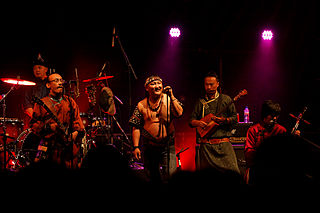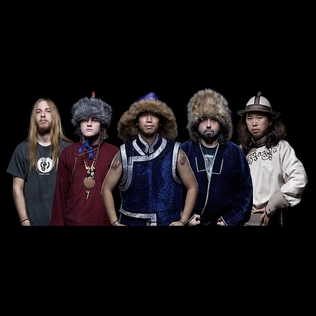
Music is an integral part of Mongolian culture. Among the unique contributions of Mongolia to the world's musical culture are the long songs, overtone singing and morin khuur, the horse-headed fiddle. The music of Mongolia is also rich with varieties related to the various ethnic groups of the country: Oirats, Hotogoid, Tuvans, Darhad, Buryats, Tsaatan, Dariganga, Uzemchins, Barga, Kazakhs and Khalha.

The morin khuur, also known as the horsehead fiddle, is a traditional Mongolian bowed stringed instrument. It is one of the most important musical instruments of the Mongol people, and is considered a symbol of the nation of Mongolia. The morin khuur is one of the Masterpieces of the Oral and Intangible Heritage of Humanity identified by UNESCO.
Buryatia is a part of the Russian Federation. One of the country's main instruments is a two-stringed horse-head fiddle called a morin khuur. This is an instrument closely linked to the all-important cult of the horse, belonging to the intangible heritage of all Mongolic peoples. Other elements of Buryat music, such as the use of fourths both in tuning instruments and in songs, and pentatonic scales, reveal similarities to music from Siberia and Eastern Asia. There traditionally was no polyphony, instead voices and instruments performed the same melody in unison but varied in timing and ornamentation.

Yat-Kha is a band from Tuva, led by vocalist/guitarist Albert Kuvezin. Their music is a mixture of Tuvan traditional music and rock, featuring Kuvezin's distinctive kargyraa throat singing style, the kanzat kargyraa.

Hurd is a Mongolian rock band. Formed in 1987 as Skorost by drummer Dambyn Ganbayar, Hurd is considered the first band to have introduced the heavy metal genre into the Mongolian music landscape. Along with Chingis Khaan, Haranga or Niciton, they are considered "veterans" of the Mongolian pop rock scene, and, as such, they have greatly contributed to its diversification and encouraged the emergence of many new rock acts.

Mongol-Tuvan throat singing, the main technique of which is known as khoomei, is a style of singing practiced by people in Tuva and Mongolia. It is noted for including overtone singing. In 2009, it was included in the Representative List of the Intangible Cultural Heritage of Humanity of UNESCO. The term hömey or kömey means 'throat' and 'larynx' in various Turkic languages. That could be borrowed from Mongolian khooloi, meaning 'throat' as well, driven from Proto-Mongolian *koɣul-aj.

Egschiglen are a Mongolian folk band, formed in Ulan Bator in 1991. In English, Egschiglen means "Beautiful Melody", and they are one of very few traditional Mongolian bands to have become internationally popular.

Namgar is a 4-piece music group that performs traditional Buryat and Mongolian music.

Hanggai is an Inner Mongolian folk music group based in Beijing who specialize in a blend of Mongolian folk music and more modern styles such as punk rock. Their songs incorporate traditional folk lyrics as well as original compositions, and are sung in Mongolian and Mandarin.
Altan Urag is a Mongolian folk rock band. Formed in 2002, the band's musical style combines traditional Mongolian and contemporary influences. They're considered to be the pioneers of mongolian folk-rock.

Tengger Cavalry was a heavy metal band originated from Inner Mongolia and Beijing and formerly based in New York state and Texas. They combine elements of the traditional music of Central Asia and music of Mongolia with heavy metal into a kind of folk metal that Billboard and CNN refer to as nomadic folk metal.
Myagmarsürengiin Dorjdagva ; 1986) is a long-song singer from Mongolia and an independent long-song researcher. In 2007-2021, he served as a researcher at the International Institute for the Study of Nomadic Civilizations (IISNC), an international institution established upon the initiative and support of UNESCO in 1998.

The Hu is a Mongolian folk metal band formed in 2016. Incorporating traditional Mongolian instrumentation, including the morin khuur, the tovshuur, and throat singing, the band calls their style of music "hunnu rock", a term inspired by the Xiongnu, an ancient nomadic empire based in Mongolia proper, known as Hünnü in Mongolian. Some of the band's lyrics include old Mongolian war cries and poetry in the Mongolian language.

Nine Treasures is a folk metal group with members mostly from the autonomous region of Inner Mongolia. Founded in 2010, the group combines traditional Mongolian music with heavy metal, notably using traditional instruments and overtone singing techniques.

The Gereg is the debut album by the Hu, released on September 13, 2019. The album takes its name from the diplomatic passport carried by Mongolian nobles and officials during the 13th century.
HAYA is a Chinese band. Founded in 2006, they integrate Mongolian music with modern pop music elements.

Rumble of Thunder is the second studio album by the Mongolian folk metal band the Hu, released by Better Noise Music on 2 September 2022. The album was announced on 8 July 2022 upon the release of the single "Black Thunder". A deluxe edition featuring bonus tracks was released on 30 June 2023.
Batzorig Vaanchig is a Mongolian throat singer. He first garnered attention for a video of him singing "Chinggis Khaanii Magtaal" on top of a mountain in Mongolia. He later sang more Mongolian folk songs using his throat singing skills.
Khusugtun is a musical ensemble from Mongolia that plays music inspired by traditional Mongolian music. The group has released 2 albums and notably performed at the 2011 BBC Proms. In 2015, the group came in second place in the first season of Asia's Got Talent. The band is named after a type of cart, named a "khusug," that nomadic Mongolians would use to transport their yurts and other belongings.
Aryun-Goa, born Aryuna Nimaeva, is a Buryat singer, musician and composer from Russia. She is known for blending traditional Buryat and Mongolian music with contemporary styles like hard rock. Aryun-Goa is the lead vocalist of the ethno-rock band NukeR.













